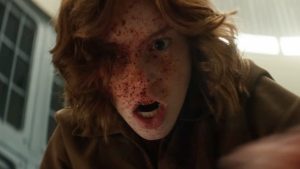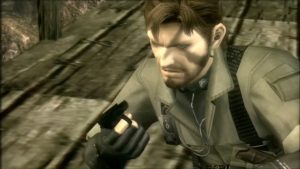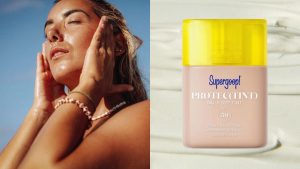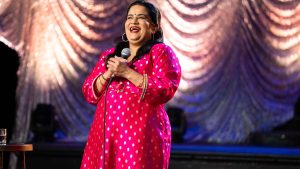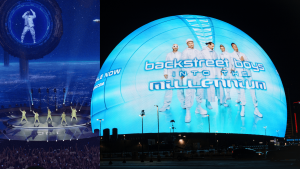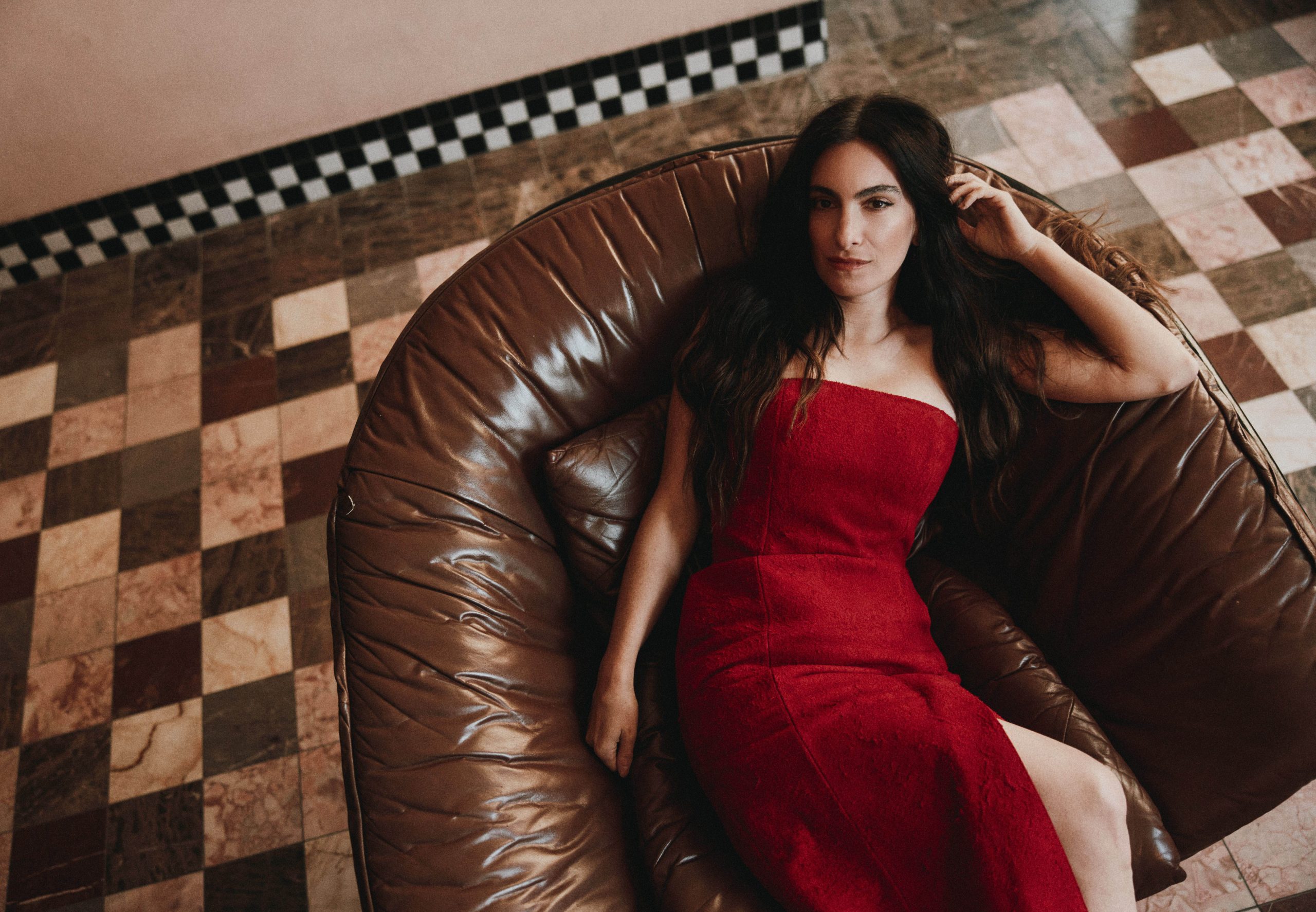
I Know What You Did Last Summer Director Jennifer Kaytin Robinson on That Killer Ending
Warning: spoilers for I Know What You Did Last Summer ahead.
When Jennifer Kaytin Robinson first saw 1997’s I Know What You Did Last Summer, she was ushered to the theater in secret. “I got snuck in by my babysitter. I was, like, nine years old,” she tells Vanity Fair over Zoom. “It was an experience.” The terror of that screening faded over time, but Robinson’s fascination with the pulpy horror film, starring some of Hollywood’s freshest three-named actors of the era (Sarah Michelle Gellar, Freddie Prinze Jr., and Jennifer Love-Hewitt) lingered.
“Middle school sleepovers,” she begins, “that’s where I was forged as a lover of cinema. And this was a sleepover banger. I mean, it was an all-timer. You had to go to a specific person’s house to watch it because not every mom was going to let you watch I Know What You Did Last Summer or Scream, or The Faculty.” Watching an R-rated movie underage wasn’t the only thrill on offer: “I also have a vivid memory of being drawn to the cover of I Know What You Did Last Summer at Blockbuster. Because everyone’s so hot.”
That eye-catching tradition carries over into Robinson’s new entry into the franchise, as led by Ava (The Studio’s Chase Sui Wonders), Danica (Outer Banks’ Madelyn Cline), Milo (The Little Mermaid’s Jonah Hauer-King), Teddy (Tell Me Lies’ Tyriq Withers), and Stevie (Sarah Pidgeon, who has been cast as Carolyn Bessette Kennedy in Ryan Murphy’s upcoming American Love Story). Per convention, the film opens on the aesthetically pleasing twentysomethings as they celebrate the Fourth of July in their seaside town of Southport. But their nighttime joyride to watch fireworks is halted when the friends inadvertently cause a fatal car wreck, then flee the scene.
Jonah Hauer-King, Sarah Pidgeon, Chase Sui Wonders, Madelyn Cline, and Tyriq Withers in 2025’s I Know What You Did Last Summer.Courtesy of Sony
On the one-year anniversary of this traumatic event, a hook-wielding fisherman begins to terrorize the group—first via threatening messages, before graduating to full-blown homicide. These methods are identical to those of the murderous maniac behind the 1997 killings, as well as a Bahamas-set rampage in the 1998 sequel, I Still Know What You Did Last Summer. That brings two of those movies’ survivors, Hewitt’s Julie James and Prinze Jr.’s Ray Bronson, back into the fold. Neither is eager to revisit the most harrowing chapters of their lives—or be reunited with each other after a nasty divorce. “I thought someone was coming to murder me,” Julie says upon seeing Ray at her doorstep. “This is worse.”
Of course, Julie had no idea just how far her ex-husband had plummeted in the years since their separation. As it’s revealed in the film’s final chapter, an embittered Ray is responsible for the Fisherman’s resurrection—and has enlisted a guilt-ridden Stevie to help carry out his homicidal urges. As Julie warns earlier in the action: “If you don’t deal with your trauma, it’ll deal with you.”
Embarking on her first theatrically-released venture after making millennial rom-com Someone Great and ‘90s-inspired Do Revenge for Netflix, Robinson talks to VF about that shocking twist, box office anxiety, and the difference between “making a movie about the internet and making a movie for the internet.”
Vanity Fair: I feel it’s only right to ask how you spent the Fourth of July.
Jennifer Kaytin Robinson: I went to a barbecue at a friend’s house. I had two hot dogs, got in the pool, felt sick from the two hot dogs, and went home. Then I watched fireworks. I live higher up in the hills, and there’s a road where you can stand and basically see the whole city. And I never drink beer, but I was like, “Oh, I’m going to go watch fireworks with a beer.”
As the founding fathers intended.
Yeah, that feels like what I should do.
Why do you think this horror franchise, considered inferior to screenwriter Kevin Williamson’s other ‘90s horror film Scream at the time of its release, has endured?
Its simplicity is what makes it enduring. It is a morality story. All of the things that happened in the first 20 minutes of I Know What You Did Last Summer are incredibly relatable. I’m not saying that everyone has done that. But relatable in that it could happen. You’ve all been driving with your friends. And we all feel pressure to make choices. When all your best friends are looking at you saying, “Don’t tell anybody what happened,” what do you do? That core conceit is what makes this such an evergreen story.
What do you make of the sequel, which certainly wasn’t as well-received, but gave us a lot of fun stuff, including an early showcase for Jack Black, who is doing a lot.
Doing, some would say, too much. I love Jack Black. I Still Know What You Did Last Summer is peak camp. I don’t know that it was meant to be camp, but I think that is camp in itself. I Still Know is wacko in wonderful ways and then crazy in ways that I don’t think if that movie were made today, those choices would be made. My biggest issue with I Still Know What You Did Last Summer is there’s a lot of service workers who are killed for seemingly no reason throughout the whole movie. I think even if those filmmakers made that movie today, they wouldn’t make that choice.
When did you first start seriously considering making your own I Know What You Did Last Summer?
Eighth grade. No, I’m just kidding. 2022 is when I got the call post-Do Revenge. And it was really an immediate yes. The first call I made was to Sarah Michelle Gellar [who also has a role in Robinson’s Do Revenge] being like, “Is this okay? Can I do this?” Then I started to map out the things that I wanted. There were pieces that kind of floated around my brain. I wanted them to be in their 20s. I liked the idea of a wedding. I wanted it to be a high body count. There are legacy sequels that I think play it slightly too safe, and I really did want to kill some people.
Then obviously the swing with Ray. I wanted one of those legacy characters, for their trauma to have calcified and turned them into the monster that once hunted them. It obviously wasn’t going to be Julie. It made sense to me, especially with Ray’s trajectory and what we know of him from the first two movies [that it would be him]. What I decided happened to him over 27 years, you could feasibly get to a place where you earned this turn.
What was it like to work with Hewitt and Prinze Jr, and reteam with Gellar, who makes a dream sequence cameo from the dead?
It’s deeply surreal. I’m constantly leaving my body and being like, “What is happening?” I needed them to be on board with what I wanted to do, and I wanted to know what they wanted before we even started writing a draft. Because they’ve lived with these characters for 27 years, especially Jen.
Courtesy of Sony
Julie is such a big part of her life and fan engagement. So it was so important to say, “What have you thought about the last 25 years in terms of bringing this franchise back? Where would Julie be? What would her life have evolved into? We both felt very strongly that she would’ve gotten the fuck out of Southport. We both had the same vision for who Julie is today, which was really lovely. And then it was about gut checking along the way and sending her passes of Julie scenes, really working in a hyper collaborative way to make sure that Julie felt right to both of us.
Oftentimes with a legacy sequel like this, the original actors are only brought in for a glorified cameo. But Julie and Ray have true arcs, and their returns feel triumphant. It must be really gratifying to see Freddie saying this is “the best work” that he and Jennifer have done together.
It was very purposeful for me. It could have been a lot of exposition for Ray and Julie, a lot of scenes where it’s like, “We’re going to tell you exactly what happened over the last 27 years.” But it was a conscious decision to not feel like I needed to over explain who Julie and Ray are. And let their performances and the subtext and the nuance of the work kind of give you the context clues that you need to understand how they feel about each other, where they are.
One of my favorite little Easter eggs is that picture of them on the docks you see in Julie’s house. If you notice, Ray’s head was cut out of it. That’s lived-in, that’s fun, that’s texture. I’m like, “Yeah, she cut his head out of the picture. That’s how she feels about him. That’s what happened.”
You also have a real knack for casting young, up-and-coming talent. How did casting for the newer characters happen?
The audition process is brutal because—and this is no fault of any actor that auditions—but if you’re not right for something, you can tell. Then the thing that happens, at least for me as a writer-director, is I’m like, “Can we not find someone because the writing is bad?” And that’s not the case. It’s just like Cinderella’s glass slipper—it’s going to fit one lady.
Everybody auditioned except Jonah. There was another movie that was going to get him and I was like, “Just give it to him.” I just knew that Jonah had to be Milo.
Chase and I talked on the phone before we read together. I remember getting off the phone with Chase and being like, “Huh, not only am I pretty sure that that’s going to be Ava, but I also really just want to be her friend.” But that’s what you want in your final girl—you want it to be the downest bitch.
Madelyn Cline was going to audition for Ava at first. I called her agent, who I’ve known for many years, and was like, “Will she read Danica?” I feel like no one is really going to Maddie for that specific thing. And they should be, because I do think that she is the reincarnation of Madeline Kahn. She’s so fucking funny. There are so many things in this movie that are her ad libs. There’s a line in the bridal shower after she opens the note [from the Fisherman] where she’s like, “Sorry, I think I just took too much Adderall this morning.” She improvised that in her audition and I wrote it into the script.
Tyriq—movie star, literally. Maddie and Tyriq actually read together and the chemistry was so crazy. I was like, “Should I leave? I feel like I shouldn’t be here.”
Sarah Pidgeon, absolute star, did her audition with a butcher knife that she was holding to her neck on Zoom. And I just was sitting there like, “Am I going to have to call a New York hospital” All five of them were so immediately the characters that it was kind of a no-brainer. The minute they opened their mouth and said the first word, I was like, “For sure.”
Courtesy of Sony
What did you want to say with Gabriette Bechtel’s character Tyler, who is investigating the 1997 murders for her podcast called “Live Laugh, Slaughter” regarding the trend of true crime as content?
It’s not just about true crime, but it’s that almost sycophantic fan of things that I think has been born of the internet, born of Twitter, born of meme culture. To me and my co-writer Sam Lansky, the most fun in creating Tyler, was creating this sapphic meme monster. You know that she just eats on Twitter, just says the best shit all day on Twitter. That kind of character who I hope doesn’t feel too forced, but just kind of exists in this world forged by the internet, was really fun for us to create.
Courtesy of Sony
You do engage with people on social media—answering questions about your movies and embracing the memes, which is something that not every filmmaker is comfortable doing. Why does it work for you?
Because I make movies for the people that love my movies on Twitter. I am such a lurker. I see everything, especially mean stuff. I think about liking mean tweets, but I don’t want them to think that I’m being a dick. Sometimes they’re really funny. But honestly, I just think about little Jen and how much I loved movies. And if I had had the ability to engage with Josh Schwartz on Twitter—that would’ve been so fucking cool. So I’m like, yeah, these are the people I make movies for. If you’re going to be really nice and ride for my thing publicly, I want to engage with you. I genuinely find it so moving and touching and cool, and it genuinely means a lot to me.
I’m always shocked if anyone ever is like, “Oh, I loved Do Revenge, or Someone Great,” I’m still like, “You saw that?” I can’t engage with the fact that maybe I’ve done a good job in my career and I have a legitimate place in this industry. I still do not feel that way and I don’t know that I ever will.
It’s also time well spent, because you seem to have such a shrewd handle on social media and internet culture in your films.
Well, I think there’s a difference between making a movie about the internet and making a movie for the internet. People think that putting social media in a movie is making a movie for the internet, but I disagree. It’s about making a movie that is going to live and have life on the internet, but not be about the internet.
Is there a moment that you’re most excited for the internet to see?
Peak powers for me are Gabriette and Chase Sui Wonders making out in a bathroom to Reneé Rapp. I feel good about that. I’m excited for it to be seen.
Both of your first two directorial features—Someone Great and Do Revenge—landed at Netflix. What does it mean to have your first film debut on the big screen?
I think about it all day, every day. I am radiating with anxiety.
Are you really?
I wake up at 4 in the morning to pee and I think about box office. So that’s the realest answer I can give you. Yeah, it’s super nervewracking. I am very proud of this movie. No number is going to take away the way I feel about what I accomplished and what we all accomplished as a unit. So it’s not like I feel like the movie’s worth or my worth as a filmmaker is tied to a number opening weekend. But it would be really cool if the number was good.
Jennifer Kaytin Robinson, writer-director of 2025’s I Know What You Did Last Summer.Emilio Madrid
What did you learn on your first two films that informed this one?
The thing that I’ve taken with me from movie to movie is knowing what your vision is, but also that everything is adaptable because you are the person changing it. As long as you’re in creative control, you have everything you need. You have you. Even if you get a note from the studio you don’t like, you still can find your way through. I am someone that’s very reactionary, and the other thing that I’ve learned is you can write the crazy email—but don’t send it. Then if you still want to send the crazy email in two hours, send the crazy email.
One of the big takeaways from this film is that all of this could’ve been avoided if men went to therapy. Can you talk about that idea—how much toxic masculinity informs the horror genre as a whole?
I mean, I think a lot of things would be better for us globally if men went to therapy. So much of this movie is informed by a man who repressed his feelings and didn’t have the tools to work through the very deeply traumatic thing that happened to him, and how it then broke up his marriage. If you have the right tools, that pain is maybe not then turned into a murder spree.
There are so many characters in this movie who, if they weren’t afraid of talking about and working through their feelings, wouldn’t, like Teddy, have that need for the bravado of standing in the middle of the street and endangering all their friends. [Local real estate developer] Grant Spencer, what is he compensating for that he needs to erase the path to this town and create this Hamptons-esque utopia? It definitely feels like that line is about more than just Ray, although it is very much obviously about Ray.
Courtesy of Sony
How did the mid-credits scene with a surprise appearance from Brandy, who plays Julie’s college roommate in I Still Know What You Did Last Summer, happen?
I always knew that I wanted Brandy in the film. It was just about making sure that she fit within the story that we were telling. Jen and I talked about the fact that Julie would have pushed everybody out of her life. Julie is hyper-aware, especially in I Still Know You Did Last Summer, that all those people were in danger specifically because of her. She would never want any of those people to be in that situation again. In her mind, that means stay the fuck away from me.
I really love the twin Final Girls scenes, the Danica-Ava scene, and then bringing back our OG Final Girls, because obviously having two is the I Still Know way. And because Julie doesn’t have a lot of people, there’s only so many people that whoever’s coming after Julie could go after. So it felt right that the events of this movie brought Julie back to her best friend.
The scene also sets up the possibility of a sequel. How realistically open are you to making that?
I mean, I’m super open to it. It’ll depend on if people see this movie and want more of it. It’s in the audience’s hands.
Do you have ideas already percolating about what it would be?
[whispers] Yeah. A lot of women are alive…we have Chase, Madeline, Sarah, Brandi, Jen—you’ve kind of got an all-star Final Girl line-up.
This interview has been edited and condensed for clarity.
The Former Soccer Player Who Spent $10 Million on the Original Birkin
The Secret Lives of Brando, Pacino, Dolly Parton, and More






